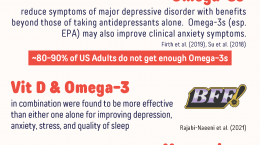Published on April 27, 2024
A review of several studies showing significant improvements in depression and other mood disorders when addressing vitamin D and other deficiencies, especially among children and teens
Key Points
- Several studies summarized here demonstrate the effects that vitamin D supplementation and correcting vitamin D deficiency can have on depression and other mood disorders, specifically among children and teens, who are at especially high risk of vitamin D deficiency
- Among teenage girls suffering from mood disorders related to PMS, correcting vitamin D deficiency resulted in significant reductions in depressive symptoms, including anxiety (score dropped from 51 to 20), irritability (score dropped from 130 to 70), and sadness (score dropped from 51 to 31); scores for disturbed relationships also decreased significantly from 150 to 70
- Additional studies have shown that omega-3s may be important for treating depression, and that higher omega-3 levels in the blood were significantly associated with a lower risk of moderately severe to severe depression, especially for those with higher EPA specifically
 Mood, behavioral, and cognitive disorders, especially anxiety and depression, are among the most prevalent mental health problems for children and teens. Depression alone is a world-wide mental health issue for both children and adults, affecting more than 300 million people worldwide. It is the leading cause of disability, contributing to approximately 5-8% of the total disability-adjusted life years (DALYs) in middle- and high-income countries.
Mood, behavioral, and cognitive disorders, especially anxiety and depression, are among the most prevalent mental health problems for children and teens. Depression alone is a world-wide mental health issue for both children and adults, affecting more than 300 million people worldwide. It is the leading cause of disability, contributing to approximately 5-8% of the total disability-adjusted life years (DALYs) in middle- and high-income countries.
Vitamin D plays an essential role in the health of the brain and nervous system and in the development of depression, and has been shown to have beneficial effects on depression, as well as stress, anxiety, and sleep. Several studies summarized below demonstrate the effects that vitamin D supplementation and correcting vitamin D deficiency can have on depression and other mood disorders, specifically among children and teens, who are at especially high risk of vitamin D deficiency.
Vitamin D Deficiency Contributes to Depression Risk in Children and Teens
The CASPIAN-III study by Ataie-Jafari et al. looked at the association between vitamin D levels and mental health among 1095 children and adolescents in Iran, with participants having an average age of 15 years old. The study found that
- 40% of participants had vitamin D levels below 10 ng/ml (25 nmol/L), and 39% had vitamin D levels between 10-30 ng/ml (25-75 nmol/L)
- self-reported anger, anxiety, poor quality sleep, sadness/depression, and worry were all significantly lower among those with adequate vitamin D levels compared to those with insufficient or deficient vitamin D levels
- 16% of adolescents with sufficient vitamin D levels reported symptoms of depression, compared to 31.4% of those with inadequate vitamin D levels (double the prevalence)
“The study found significant associations between vitamin D deficiency and self-reported psychiatric distress as angriness, anxiety, poor quality sleep, sadness/depression, and worry.”
Supplementing Children & Adolescents with Vitamin D Decreased Depressive Symptoms
A randomized controlled trial by Libuda et al. enrolled 113 adolescents and children between the ages of 11 and 18 years old with vitamin D deficiency (12 ng/ml or lower) and who had mild to severe depressive symptoms. This study gave 2,460 IU/day of vitamin D over a period of only 28 days. This study found that
- 49.3% of children and teens screened for enrollment had vitamin D deficiency
- supplementation improved vitamin D levels by an average of 14 ng/ml
- supplementation resulted in improved vitamin D levels and a significantly noticeable reduction of depressive symptoms as reported by parents of the participants
Correcting Vitamin D Deficiency Improved Depression Among Teen Girls
A study by Bahrami et al. looked at depression among 940 adolescent girls receiving 50,000 IU weekly for 9 weeks. This study found that
- the average vitamin D level at baseline was 6.7 ng/ml; supplementation increased the average vitamin D level to 35.5 ng/ml
- girls receiving vitamin D had significant reductions in all levels (mild, moderate, and severe) of depression
Vitamin D Improved Mood Disorders Related to PMS
Another study by Tartagni et al. enrolled 158 adolescent girls (ages 15-21 years old) with severe emotional and cognitive symptoms related to PMS, who also had vitamin D deficiency (10 ng/ml or lower). They gave 200,000 IU of vitamin D as a loading dose, followed by 25,000 IU every two weeks; doses were found to be safe with no adverse effects observed during the trial. This study found that
- vitamin D levels reached 35-60 ng/ml after the first month of supplementation and remained stable throughout the remainder of the study
- there were significant reductions in depressive symptoms, including anxiety (score dropped from 51 to 20), irritability (score dropped from 130 to 70), and sadness (score dropped from 51 to 31); scores for disturbed relationships also decreased significantly from 150 to 70
Omega-3 Fatty Acids Also Significantly Affect Mood and Behavior
Many studies have now demonstrated a significant relationship between depression and other mood disorders and omega-3 fatty acid status and intake. A handful of the studies are mentioned below.
- An analysis by Murphy et al. supports previous findings that omega-3s may be important for treating depression, and found that higher omega-3 levels in the blood were significantly associated with a lower risk of moderately severe to severe depression, especially for those with higher EPA specifically.
- Other studies have shown improvements in mood, anxiety, ADHD, bi-polar disorder, psychosis, autism, and other mental, cognitive, and emotional disorders among adults and children with higher omega-3s.
- The world’s largest review (called a meta-synthesis) of nutrient supplements and mental disorders published by Firth et al. examined 33 meta analyses of randomized controlled trials on dietary supplements and mental health. The analysis included data from 10,951 individuals with diagnoses such as depression, stress and anxiety, bipolar, personality disorder, schizophrenia, and attention-deficit/hyperactivity disorder (ADHD). The strongest evidence from this review showed the effect of omega-3s (with an average dose of 1422 mg/day of EPA) on reducing symptoms of major depressive disorder, which produced benefits beyond those of taking antidepressants alone. The strongest effect was seen with omega-3 supplements that contained at least 50% EPA.
- A study by Rodriguez et al. found that omega-3 supplementation (specifically DHA) led to greater improvements in cognitive and visual-sensory test performance as well as behavioral improvements compared to placebo among children and adolescents with ADHD.
- Other findings mentioned by Dr. Bill Harris in this video include improved anxiety levels among children receiving approximately 1.6 g/day of omega-3s, higher depression scores among individuals with the lowest Omega-3 Index, and a higher risk of psychosis among those with the lowest Omega-3 Index.
Vitamin D and Omega-3s are Simple, Safe, and Effective When it Comes to Improving Mental Health – Measure Your Levels Today
As part of the GrassrootsHealth D*action project, you can measure your:
- Vitamin D
- Magnesium PLUS Essential and Toxic Elements
- Omega-3 Fatty Acids
- hsCRP
- HbA1c
- TSH
- Type 1 Diabetes Autoantibodies
Take steps to improve the status of each of these measurements to benefit your overall health. You can also track your own intakes, symptoms and results to see what works best for YOU.
Enroll and test your levels today, learn what steps to take to improve your status of vitamin D (see below) and other nutrients and blood markers, and take action! By enrolling in the GrassrootsHealth projects, you are not only contributing valuable information to everyone, you are also gaining knowledge about how you could improve your own health through measuring and tracking your nutrient status, and educating yourself on how to improve it.






